Blogs » Politics » Two Tibetans Sentenced over Self-Immolations
Blogs » Politics » Two Tibetans Sentenced over Self-Immolations |
- Two Tibetans Sentenced over Self-Immolations
- Sharp Arrow Operation: World War II Kung Fu
- Joseph Nye tells NPR’s Neal Conan China’s concerns over containment can be dismissed
- Chinese Web Users Gasp — In Code — As NYT Cyber Attacks Exposed
- New York Times Hacked Following Wen Family Wealth Investigation
- A New Way for Chinese Migrant Workers to Collect Back Pay: Go Viral on the Web
- Mourning Candles & Smileys for Dead Japanese Hostages
- Photo: Soup, by Mark Hobbs
- Word of the Week: Temporary Workers
- Fresh Air Goes on Sale
- Chinese Blogosphere Reacts to Japanese Hostage Deaths With Burning Candles — And Smiley Faces
- Two Versions of Mao's China: History Retouched as Propaganda
- Kai-fu Lee: 78 Innocent Weibos Hounded to Death
| Two Tibetans Sentenced over Self-Immolations Posted: 30 Jan 2013 10:58 PM PST Two Tibetans accused of inciting self-immolations were sentenced on Thursday. Following a trial held last Saturday, the two were convicted of intentional homicide in line with a legal ruling issued last month.
Death with a two-year reprieve is generally commuted to life or fixed-term imprisonment at the end of the two years. According to Xinhua, this reduced sentence was given because Lorang Konchok had "recounted the main facts of the case, pled guilty and showed repentance during the trial". His accounts have been used in state media to accuse overseas organizations and "the Dalai clique" of involvement in the protests. © Samuel Wade for China Digital Times (CDT), 2013. | Permalink | No comment | Add to del.icio.us |
| Sharp Arrow Operation: World War II Kung Fu Posted: 30 Jan 2013 09:51 PM PST How does a Chinese television producer please viewers and censors alike? How many "Anti-Japanese War" shows can the Chinese public take before they decide to tune out for good? How much patriotic programming can a channel drop before SARFT chafes? Sharp Arrow Operation (利箭行动) has something for everyone: it is just the latest in a decades-long line of World War II TV dramas, but with a martial arts kick. Shot at Hengdian World Studios in Zhejiang Province, Sharp Arrow's 35 episodes cost RMB 50,000,000 (US$8 million). It is the big-budget, action-packed answer to the demands of state and public. As this gif makes the rounds online, netizens chuckle at the fictional bloodbath:
Via CDT Chinese. © Anne.Henochowicz for China Digital Times (CDT), 2013. | Permalink | No comment | Add to del.icio.us |
| Joseph Nye tells NPR’s Neal Conan China’s concerns over containment can be dismissed Posted: 30 Jan 2013 09:43 PM PST Joseph Nye recently spoke to NPR's Neal Conan about the disputed islands in the East China Sea between China and Japan. Overall, I think Nye adds a helpful voice of moderation within the American public discourse on this issue. In the U.S.-China context, I also fully agree with him that if there is any sort of containment towards China, it is certainly not the same type as conceived by George Kennan against the former Soviet Union where United States allowed no Soviet students and had virtually no trade. However, when Conan posed America's encirclement as the source of China's containment fear, I thought it was a mistake for him to outright dismiss the concern in the fashion he did. First, here is how Conan phrased the concern:
In response to the above, Nye said:
So, the truth is that China naturally feels encircled. Granted, the current geopolitical configuration in East Asia is the result of WW2 and the Cold War. Using the specter of war to sweep a legitimate issue under the carpet is not the solution. In fact, I would be surprised if the leaders of the two countries do not discuss that encirclement and what happens when the relative strengths change in the coming decades. What is not helpful is the American public been mislead to think China's fears are irrational, and hence everything she does as a result of it is simply 'bad' government. There are hawks in China too. This issue not discussed openly and in a honest fashion only serves the hawks. Even if Nye was to say America simply has lingering fear of China and that the encirclement is a form of hedge, at least that provides an outlet, because in the Chinese eyes, they can see working towards building more trust as the solution. Conversely, how can America build trust with China such that China's fear of encirclement is lessened? |
| Chinese Web Users Gasp — In Code — As NYT Cyber Attacks Exposed Posted: 30 Jan 2013 09:03 PM PST  According to reports, Chinese hackers attacked the New York Times over a period of four months. (David Wertime/Tea Leaf Nation) After the New York Times published an article detailing the four months during which the venerated publication was the subject of hacking attacks traced to China, the news spread on Sina Weibo, China's Twitter. Despite internal censorship measures and the blocking of some sensitive keywords, some users nevertheless found a way to comment on the article. Popular Weibo user and vocal critic @假装在纽约, whose handle means "Pretending to be in New York," posted a screenshot of the Times article in English, with the simple Chinese tagline, "For 4 months, Chinese hackers with government backgrounds launched fierce attacks against that New York paper." He then translated several key points from the article for his followers, including information supporting the piece's argument that the hackers were likely affiliated with the Chinese military. In response to his post, a number of users simply posed a rhetorical question: "Lanxiang?" The term is an abbreviation for Shandong Lanxiang Vocational School, an institution of higher learning known to produce hackers employed by the Chinese government. One user warned "Pretending to be in New York," "Better not get on the bad side of the People's Liberation Army," while another speculated, "I bet your account is going to be deleted." Since the Times published an expose on the wealth accumulated by Premier Wen Jiabao's family last year, its website has been intermittently blocked and its content selectively censored; the media outlet's Chinese name has been temporarily censored on various microblogging platforms, as have several homonyms for the paper, forcing Chinese Web users to get creative when referring to it. Posts related to the Times' most recent offending piece were also censored, according to Twitter user @MissXQ. As for the post by "Pretending to be in New York," it remains uncensored at the time of publication, having garnered 80 comments and 207 retweets in about an hour. The Weibo critic wasted no time in devising a back-up plan, however, reposting a comment he had made a week earlier. "If this account is ever gone," he wrote, "Please follow @假耳朵." |
| New York Times Hacked Following Wen Family Wealth Investigation Posted: 30 Jan 2013 08:47 PM PST The New York Times' Nicole Perlroth reports that computers belonging to the newspaper and its staff have suffered repeated attacks over the past four months, apparently from within China. The intruders appeared to focus on identifying sources for David Barboza's investigation into Wen Jiabao's family's business dealings: although Barboza claimed that his research was based on publicly available records, some suspected a deliberate leak by Wen's political opponents. China's Ministry of National Defense has denied any involvement in the attacks.
© Samuel Wade for China Digital Times (CDT), 2013. | Permalink | No comment | Add to del.icio.us |
| A New Way for Chinese Migrant Workers to Collect Back Pay: Go Viral on the Web Posted: 30 Jan 2013 08:47 PM PST Millions of Chinese migrant workers fail to get paid for their work each year, in spite of ongoing government efforts to increase official monitoring of labor relations in the country. For some, however, attracting media attention and sympathy from China's online community has proven to be an effective method of pressuring errant employers into coughing up outstanding wages. According to official statistics — which many regard as highly subjective — Chinese employers withheld over 2 million migrant workers' wages in 2011. Each year, the number of such cases surges with the approach of the Spring Festival holiday, when migrant workers, young and old, prepare to return home to their families with the year's wages in hand. Workers who don't get paid are often forced to resort to bizarre antics to try to attract media attention, in the hopes of pressuring local governments into addressing their complaints. Gangnam style, meet social justice After failed attempts to reason with his employer, for example, a contractor in Wuhan decided to upload a video appeal to the Chinese blogosphere on January 21. He and some of his crew smiled shyly as they muddled through a subdued rendition of Gangnam Style, while proclaiming, "Pay me my wages so I can go home and celebrate the Spring Festival!" After a week of exposure on China's news and in the blogosphere, the crew of about 40 workers was paid 206,000 RMB (about US$33,000) in outstanding wages, in what state news agency China Daily described as "the coordination of government departments, which noted the wide media coverage." Another group of migrant workers who failed to get paid issued a mock foreign ministry statement condemning the "dishonorable actions" of their employers and the local government who failed to protect them, and eventually got their case referred to the Supreme People's Court. But this only happened after their video appeal received media attention and went viral on China's Internet last October. Getting paid, one way or another The desperate plight of many migrant workers has even given rise to a cottage consultant industry. Since successfully getting his outstanding pay in 2007 — which he accomplished by threatening to jump off a building — erstwhile laborer Zhang Jinhe has become a sought-after resource for migrant workers whose employers refuse to pay. In a recent interview with China Central Television (CCTV), Mr. Zhang stated that he sometimes gets multiple calls for help per day, and has assisted in the recovery of more than 7 million RMB (about US$1.1 million) in outstanding wages since 2007. "When I can attract media attention to a case," he told CCTV, "I have a success rate of more than 95% at recovering withheld wages." China's government has attempted to remedy the issue by increasing labor oversight and upping punishments for employers who illegally withhold wages. But millions of migrant workers continue to struggle to get paid due to what Chinese news agency Xinhua recently referred to as "systemic loopholes and inadequate implementation." An employee for a labor education board, for example, was recently caught on camera yelling at a group of migrant workers who came to complain about not receiving their wages, to "go tell the government, not us." China's blogosphere as labor's ally Campaigns by unpaid migrant workers to garner media attention for their plight have also sparked discussion on China's Twitter-like microblog platform Sina Weibo, where many users express admiration for the courage and creativity of those migrant workers who speak out. "Now that's talent," @尖兵刺探 commented in response to the mock foreign ministry statement. User @木羊向前冲 wrote, "I hope that comrade doesn't get arrested." Other web users point the finger at their government, decrying the fact that migrant workers are forced to resort to such antics just to get their meager wages. @紫儿violet lamented, "Migrant workers have to resort to methods like these to get paid. Oh, government, you've disappointed us." @糳爱也疯狂 wrote, "That's just the way life is for us pimin [a slang word meaning 'nobodies']." As Chinese lunar new year approaches, it is customary to post auspicious Chinese characters on the wall to invite good fortune in the coming year. When it comes to a boss who won't pay, however, posting a video appeal to the blogosphere might bring more luck. |
| Mourning Candles & Smileys for Dead Japanese Hostages Posted: 30 Jan 2013 05:40 PM PST At Tea Leaf Nation, Minami Funakoshi considers perceived differences between the Sina and Tencent Weibo platforms based on reactions to an Asahi Shimbun post on Japanese deaths in the recent Algerian hostage crisis.
In both cases, however, initial responses may be misleading, and Funakoshi concludes that "Netizen opinion is fickle, time-dependent, and unreliable — especially when viewed as a proxy for Chinese opinion." For more on the potential pitfalls of Weibo-watching, see 'Weibo's Limits and the Ballad of China's Middle Class' at CDT. Sina Weibo's candle icon previously appeared on CDT after it was temporarily removed last June so it could not be "lit" in memory of the 1989 Tiananmen crackdown. © Samuel Wade for China Digital Times (CDT), 2013. | Permalink | No comment | Add to del.icio.us |
| Posted: 30 Jan 2013 05:06 PM PST © Samuel Wade for China Digital Times (CDT), 2013. | Permalink | No comment | Add to del.icio.us |
| Word of the Week: Temporary Workers Posted: 30 Jan 2013 12:00 PM PST The Word of the Week comes from China Digital Space's Grass-Mud Horse Lexicon, a glossary of terms created by Chinese netizens and frequently encountered in online political discussions. These are the words of China's online "resistance discourse," used to mock and subvert the official language around censorship and political correctness. 临时工 (línshígōng): temporary workers "Temporary workers," whoever they may be, are often used as a convenient scapegoat by officials. When several sponsors of the The Backbone Award withdrew their money, they claimed their support had been granted through documents forged by "temporary workers." In January 2013, one netizen quipped that Beijing's two million propaganda workers "outside the system" must be temporary workers. © Anne.Henochowicz for China Digital Times (CDT), 2013. | Permalink | No comment | Add to del.icio.us |
| Posted: 30 Jan 2013 08:40 AM PST As Beijing residents are once again advised to stay indoors amid choking air pollution, some environmentalists are pessimistic about the possibilities for a thorough clean-up. From Bloomberg:
People with an entrepreneurial spirit have started to make money by selling fresh air in cans. From John Garnaut at The Sydney Morning Herald:
James Fallows at The Atlantic notices a less humorous related phenomena: birth defects and cognitive disorders related to the heavy pollution:
See more on air pollution via CDT. © Mengyu Dong for China Digital Times (CDT), 2013. | Permalink | No comment | Add to del.icio.us |
| Chinese Blogosphere Reacts to Japanese Hostage Deaths With Burning Candles — And Smiley Faces Posted: 30 Jan 2013 06:26 AM PST The Chinese Web version of Asahi Shimbun, one of Japan's largest newspapers, posted the following image on Sina Weibo, China's most active microblogging platform: The screenshots shows two remarkably similar posts, the top from Sina's Weibo platform, which has about 400 million users, the lower from Internet giant Tencent's own Weibo platform, which, according to last year's announcement, has about 540 million users. The two posts in the screenshot have the same headline, "Algeria: seven Japanese hostages perish." They uploaded the same photo, that of Japanese Prime Minister Abe and other ministers in his cabinet, and link to the same Asahi Shimbun article. The post refers to the Algeria hostage crisis that erupted on January 16, 2013, when Islamist militants seized a gas field complex in the Sahara dessert and held over 30 foreigners hostage. To resolve the issue, Algerian forces entered the scene; the ensuing four-day conflict between militants and troops left 37 foreign hostages dead. Of the 37 foreign hostages, ten were Japanese. (After the posting of this comment, three more Japanese deaths were confirmed.) But even a reader with no Chinese language skills will notice a troubling difference: at top, commenters lit virtual candles of mourning; at bottom, reactions consisted of laughter and celebration. The Chinese people have long had mixed feelings toward Japan. After the 2011 Tohoku Earthquake — the largest ever recorded in Japanese history — hit the island nation, some Chinese Web users expressed condolences, while others rejoiced in Japan's tragedy. But why is there such a sharp divide between users of two different Weibo platforms? Are Chinese Web users on Sino Weibo more sympathetic toward the Japanese? Does anti-Japan sentiment really run stronger on Tencent Weibo? Yet another digital divide — maybe Some Chinese Web users certainly think so. "Sina Weibo users are obviously relatively mature," posted one user, @卟懂_作业先森他不爱我, on Sina Weibo. "This is why I don't use Tencent Weibo," commented another user, @姬旦. Defenders of Tencent Weibo, however, attribute the difference in online reaction to the different degrees of censorship. "This is because some posts on Sina Weibo were 'killed,'" argued @千树枯, "If you look at it from this perspective, Sina Weibo is truly tragic!" The mechanics of Weibo chatter According to reinforcement theory, people seek out information, discussions and forums that confirm, rather than challenge, their pre-existing views. With time, however, it is apparent that debates in these threads became more divergent and less black-and-white. In the case of the Asahi Shimbun's tweets, Sina Weibo users with strong anti-Japan sentiments may have flocked to Tencent, and sympathetic Tencent Weibo users to Sina Weibo. Over time, however, reactions of Sina and Tencent Weibo users, initially quite divergent, came to resemble one another. Over the five days following its initial posting on Sina Weibo, Asahi Shimbun's tweet garnered more varied responses. Amidst posts with burning candles and expressions of condolences were malicious comments such as: "The Japanese dogs will finally become obedient and well-behaved," (@微笑塞亚) and "It serves them right; little Japan should die" (@评论比内容更精彩). This shift in user reactions perhaps points to an overall pattern in online activity on Chinese social media: an initial stage of uniformity and extremism, followed by gradual divergence. If this is the case, what causes opinions to deviate from each other? Does one outspoken user's comment trigger others to express opposing views as well? The answer remains unclear in the chaos of Weibo chatter. The dangers of reading Weibo at a glance Asahi Shimbun's observation not only highlights potential differences between the Sina and Tencent platforms, but showcases the danger of culling sentiment from Weibo posts by looking at only one point in time. No matter how uniform they may initially seem, opinions expressed on any one thread change over time, and are not necessarily representative of overall public opinion. Especially in China — where many netizens rely on Weibo as their first and main source of information — the volatility of reactions to information on the platform can plant skewed views in the minds of its users. This should be something for foreign China-watchers who follow Weibo to keep in mind too. Netizen opinion is fickle, time-dependent, and unreliable — especially when viewed as a proxy for Chinese opinion. So, icons of burning candles or smiley face emoticons — which truly represents Chinese reaction to the news of Japanese hostage deaths in Algeria? The answer is: both. |
| Two Versions of Mao's China: History Retouched as Propaganda Posted: 29 Jan 2013 10:50 PM PST On January 29-30, 2013 one of the top ten micro-blogs in Sina Weibo, the most influential micro-blogging platform in China, has a set of historical photos showing two versions of the Chinese history during Mao's Era (1949-1976). The micro-blog, in the form of a collage, published by @Pongyoung with a brief comment: "How history has been amended?", has been retweeted 13362 times with 2237 comments within one day. The photos and their explanation were originally published by the history channel [zh] of ifeng.com. In order to help our readers see the difference between the two versions of the Chinese history, I cut the collage into 10 photo sets with a brief explanation.  The missing person on the second photo is Lin Biao, a former Chinese Communist Part leader who was condemned as a traitor after his failed attempt to escape to Mosco in 1971. He was killed in a plane crash during his escape.  The missing person is Peng Dehuai, who was a prominent Chinese Communist military leader. He was prosecuted during the Cultural Revolution and died in prison in 1974. 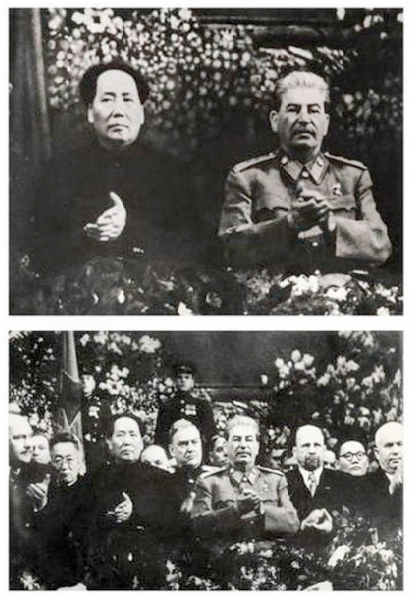 The image amendment is to single out the two greatest leaders of the era: Mao Zedong and Joseph Stalin.  Irrelevant people are deleted so as to highlight the leader.  The missing person is Peng Zhen, also once a CCP leader. He was purged during the Cultural Revolution for opposing Mao's views on the role of literature in relation to the state.  The umbrellas and those carrying them had obstructed the stage and thus deleted.  The photo was originally taken in 1927 among a group of intellectuals and writers – Zhou Jianren, Xu Guangping, Lu Xun (front from the left) and Sun Xifu, Lin Yutang, Sun Fuyuan (back from the left). Lin Yutang escaped to Taiwan in 1949 and in March 1977 when the photo was republished Lin Yutang and Sun Xifu were deleted.  Lei Feng, a solider of the People's Liberation Army, was portrayed as a model citizen after his death. The background of his photo was changed into a pine tree, which symbolizes evergreen for political propaganda purposes. 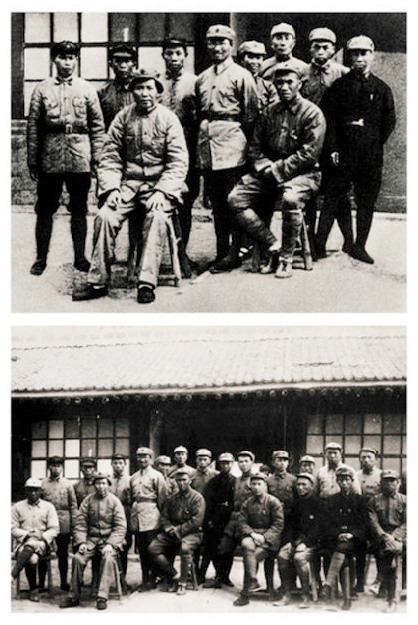 Many comrades who had been trained with Mao Zedong in the Red Amy Camp in 1937 went missing when the photo was published during Mao's era. The original photo only surfaced in 1986 during Deng Xiaoping's era. 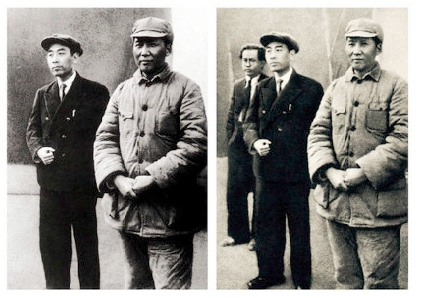 The missing person is Ren Bishi, a CCP military and political leader. The photo was taken in 1940 with Zhou Enlai and Mao Zedong. Ren was deleted because he was criticized for being sick and hospitalized in USSR in during the Chinese liberation war. Written by Oiwan Lam · comments (0) |
| Kai-fu Lee: 78 Innocent Weibos Hounded to Death Posted: 30 Jan 2013 12:05 AM PST Kai-fu Lee, dubbed 2012′s most influential Weibo personality by Sina, has decided to market more than his self-help books today. Google China's former CEO has just posted an image of every single post deleted from his Weibo account over the last six months:
As of posting, Lee's weibo of weibos has been reposted 5447 times and commented on 3581. It has not yet been removed. A business guru and best-selling author, Lee is not a political activist by any means. Nor does he have personal grievances with the Chinese government; Taiwanese by birth and American by citizenship, he only stands to lose business from his current perch in mainland China. For Lee to broadcast such carefully documented evidence of censorship to his audience of over 27 million followers is to bring a "fringe" concern to the mainstream. His move comes just weeks after Yao Chen's viral weibo in support of the Southern Weekly protesters in early January. Everyone is affected by censorship in China–now they're talking about it. A sampling of Lee's defunct posts:
* The abbreviation "collars and sleeves" (领袖) also means "leader."
There are plenty of vicious attacks on Lee among the comments he received, but each one carries the taint of the Fifty Cent Party. Praise for Lee, on the other hand, is sincere:
Walk through Lee's weibo graveyard at CDT Chinese. © Anne.Henochowicz for China Digital Times (CDT), 2013. | Permalink | No comment | Add to del.icio.us |
| You are subscribed to email updates from Update » Blogs » Politics To stop receiving these emails, you may unsubscribe now. | Email delivery powered by Google |
| Google Inc., 20 West Kinzie, Chicago IL USA 60610 | |





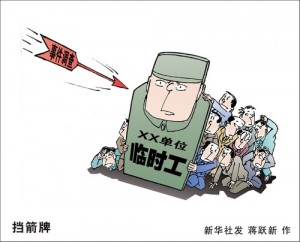



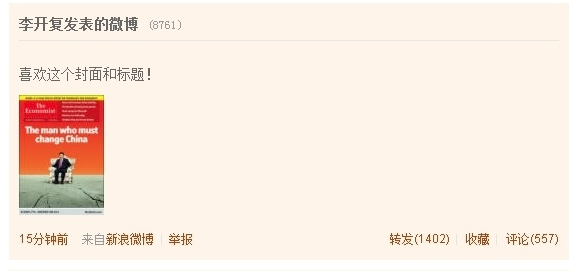

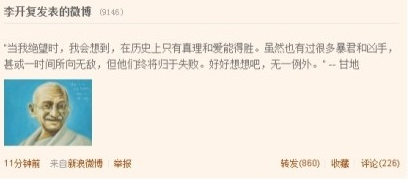
Comments